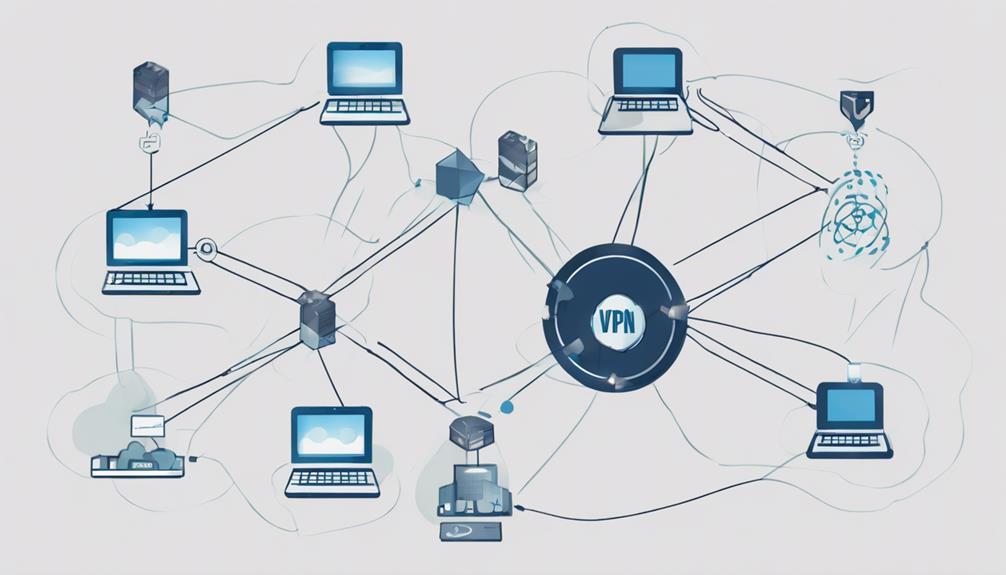When exploring VPN types, it's crucial to understand personal VPN services, mobile VPNs, and remote access VPNs. Personal VPNs guarantee secure and private online activities through encrypted connections. Mobile VPNs protect data on mobile devices, perfect for public Wi-Fi use. Remote access VPNs provide a secure link for remote users to private networks, assisting in secure data transmission and remote file access. Delving deeper into the VPN domain can reveal even more tailored solutions to meet specific needs.
Key Takeaways
- Personal VPN Services enhance online anonymity and safeguard data with encrypted connections.
- Mobile VPNs encrypt data on mobile devices for security on public Wi-Fi networks.
- Remote Access VPNs provide secure connectivity for remote users to access private networks.
- Site-to-Site VPNs establish encrypted connections between multiple fixed locations for data transmission.
- Extranet-based Site-to-Site VPNs facilitate secure communication between distinct organizations for data sharing.
Personal VPN Services

Personal VPN services provide you with a secure and private way to safeguard your online activities and data from potential threats. By using encrypted connections, these VPNs guarantee that your information remains safe, especially when accessing public Wi-Fi networks. Popular services like NordVPN, Surfshark, and ExpressVPN offer reliable options for maintaining your privacy online.
With a personal VPN, you can also enjoy enhanced online anonymity, preventing third parties from tracking your browsing habits. Additionally, these VPNs allow you to bypass geo-restrictions, giving you access to content that may be limited in your region.
Whether you're concerned about privacy, online security, or content accessibility, a personal VPN is a valuable tool for protecting your digital presence.

2. PIA - Ton of servers world wide, but especially great in United States.***

3. NordVPN - The bigger the better! A great choice everywhere!***

*** Offers money-back guarantee. So try them risk free!
Mobile VPNs
Shifting from Personal VPN services to Mobile VPNs, you'll find that these VPNs are specifically tailored for mobile devices such as smartphones and tablets to securely connect to public Wi-Fi networks.
When using Mobile VPNs, your data transmitted over mobile devices is encrypted, providing a secure connection that safeguards your privacy and security. These VPNs play a critical role in ensuring the protection of sensitive information while accessing public Wi-Fi hotspots or working remotely.
Additionally, Mobile VPNs enable you to securely access your company's network from anywhere, enhancing productivity on the go. By creating a secure tunnel for mobile traffic, Mobile VPNs prevent unauthorized access and maintain the integrity of your data.
Remote Access VPNs

Remote Access VPNs provide secure connectivity for individual users to access private networks from remote locations, facilitating secure transmission of data and guaranteeing privacy and confidentiality. These VPNs create a secure tunnel for data transmission, allowing users to connect to the company's network securely.
By using Remote Access VPNs, users can access files, databases, and applications as if they were physically present in the office, enhancing productivity for remote workers, travelers, and businesses. Popular examples of Remote Access VPN services include PureDome by PureVPN and OpenVPN Access Server.
Utilizing a Remote Access VPN guarantees that sensitive information remains protected during transmission, maintaining the integrity and security of the network connection for remote users.
Site-to-Site VPNs
Moving from individual user connectivity to secure links between multiple fixed locations, Site-to-Site VPNs establish encrypted connections over public networks for seamless data transmission. Businesses commonly utilize these VPNs to securely connect different branches or offices, ensuring all transmitted data is encrypted for enhanced security.
Site-to-Site VPNs enable efficient collaboration and resource access across geographically dispersed locations. Through these secure connections, organizations can seamlessly communicate and share data among their various office sites.
This type of VPN plays an essential role in facilitating secure and reliable communication channels between different fixed locations, providing a robust framework for businesses to operate seamlessly across multiple sites.
Extranet-based Site-to-Site VPNs

Facilitating secure communication between distinct organizations or entities, Extranet-based Site-to-Site VPNs establish encrypted connections to enable data sharing between internal networks. These VPNs are important in business partnerships where resources and sensitive information need to be exchanged securely.
By ensuring that data is encrypted and protected during transmission, Extranet-based Site-to-Site VPNs offer a reliable means for organizations to collaborate securely. Through these secure connections, separate entities can establish a safe environment for sharing valuable data and resources.
This type of VPN plays a critical role in fostering trust between organizations, enabling them to work together seamlessly while keeping their sensitive information secure and confidential.
VPN Protocols Used
The utilization of VPN protocols is integral to establishing secure and efficient network connections. VPN protocols such as OpenVPN, IPSec/IKEv2, and WireGuard offer distinct features catering to different needs:
- OpenVPN: Known for its flexibility and robust security features, OpenVPN is a popular open-source protocol that provides a high level of security and customization options.
- IPSec/IKEv2: This protocol is favored for its speed and stability, making it a suitable choice for Windows operating systems where fast and reliable connections are essential.
- WireGuard: A lightweight and modern protocol designed for high performance, WireGuard offers a stable and efficient solution that's easy to use and maintain, making it an excellent choice for users looking for a fast and secure VPN connection.
Frequently Asked Questions
What Are the 3 Most Common VPN Protocols?
Discussing the three most common VPN protocols – OpenVPN, IPSec/IKEv2, and WireGuard. Each offers unique benefits like security, speed, and compatibility. Choose based on your needs; OpenVPN for versatility, IPSec/IKEv2 for stability, or WireGuard for lightweight performance.
Which Type of VPN Is Best?
When it comes to choosing the best type of VPN, consider your specific needs. For businesses with multiple locations, site-to-site VPNs excel. Individual users benefit from remote access VPNs. Personal VPNs suit general internet browsing and privacy maintenance.
What Are the Three VPN Technologies Defined?
When contemplating VPN technologies, it's crucial to understand the distinctions. Remote access, site-to-site, and intranet-based VPNs offer specific connectivity solutions. Each serves unique needs and security levels for remote network access or inter-site communication.
What Are Two VPN Types?
When selecting VPN types, consider remote access for individual connections and site-to-site for office networks. Both provide secure connectivity options for different scenarios. Evaluate your needs to determine the best VPN type for your network requirements.










